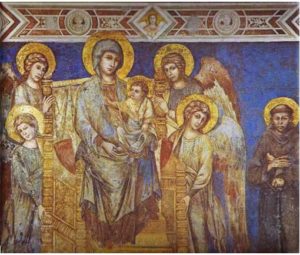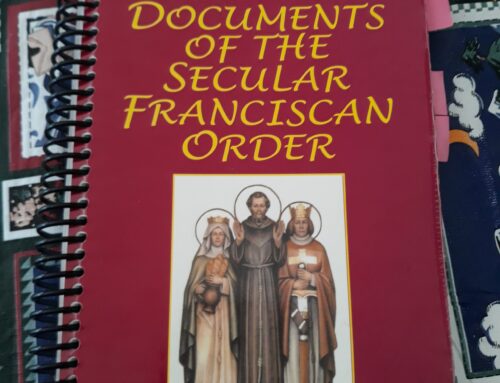 The Blessed Mother certainly does not need me to sing her praises! Our Father Saint Francis did a far greater job both in word and in action; in word, by his Praises and Salutations, and in action, by entrusting the whole Order to her protection.
The Blessed Mother certainly does not need me to sing her praises! Our Father Saint Francis did a far greater job both in word and in action; in word, by his Praises and Salutations, and in action, by entrusting the whole Order to her protection.
Thomas of Celano wrote of St. Francis, “Toward the Mother of Jesus he was filled with an inexpressible love, because it was she who made the Lord of Majesty our brother. He sang special Praises to her, poured out prayers to her, offered her his affections, so many and so great that the tongue of man cannot recount them. But what delights us most, he made her the advocate of the order and placed under her wings the sons he was about to leave that she might cherish them and protect them to the end” (Second Life of St. Francis, 198).
Our SFO Rule 9 states: “The Virgin Mary, humble servant of the Lord, was open to His every word and call. She was embraced by Francis with indescribable love and declared the protectress and advocate of his family. The Secular Franciscans should express their ardent love for her by imitating her complete self-giving and by praying earnestly and confidently.” (See also General Constitutions, Article 16.)
The only way that we can see the Blessed Mother directly, outside of private revelation, is through Holy Scripture; and each time she appears, she is, to me, fascinating and unpredictable. I am filled with wonder. Although this Monthly Message is not enough to share all of her moments in Sacred Scripture, permit me to speak on two of them, both in John’s Gospel, one at the very beginning of our Lord’s ministry and one at the very end.
As we know, just three days into our Lord’s public ministry and call of His disciples, there is a wedding at Cana in Galilee (Chapter 2). The Blessed Mother has been invited and perhaps because of her, Jesus, and perhaps because of Jesus, His disciples. We don’t see St. Joseph because presumably he had already died. The wine runs short, perhaps because of the unexpected presence of the recently called disciples, and the Blessed Mother tells her son, “They have no wine” (vs. 3). Jesus replies, “Woman, how does your concern affect me? My hour has not come” (vs. 4). Mary says to the servers, “Do whatever he tells you” (vs. 5).
Jesus promptly tells the servers to fill six twenty to thirty gallon stone water jars with water and take some to the headwaiter. The water miraculously turns to wine; the headwaiter does not know from whence it comes and cannot believe why the bridegroom would save the best for last, so high is the quality of the wine. John concludes, “Jesus did this as the beginning of his signs in Cana in Galilee and so revealed his glory, and his disciples began to believe in him” (vs. 11).
Well, books have been written and paintings painted about the Wedding of Cana, which now forms the Second of the great Luminous Mysteries of the Holy Rosary. My question to you and to myself is, “Who was the couple?” Why do they receive Christ’s first miracle (not to mention 180 free gallons of the best quality wine)? To me, this couple is you and I, ordinary lay people trying to live our lives in the world not quite having all that we need without some divine help. Note that Jesus does not say it is “their concern,” but says to His Mom, it is “your concern.”
Flash forward to the very end of His short life. Jesus again has saved the best for last, only this time it is not wine but Himself, hanging on the Cross pouring out His blood and His life for all of us. He is alive and around Him are exactly the people that we find in the Cross of San Damiano and see in John 19:25. And seeing his Mom and the disciple whom He loved, both present at the Wedding of Cana, Christ “pays back” His Mom. His hour has indeed come. Since she was so concerned about ordinary humanity at the very beginning of His ministry, so He will keep her concerned, “Woman, behold your son” (vs. 26). And to the disciple, “Behold your mother” (vs. 27).
Just as Jesus did not say “No” to His Mom at Cana, so Mary does not say “No” to her Son on the Cross. She has been concerned with all humanity at the beginning, so Jesus wants her concerned now. She is truly our Mother.
Let us pray: “Lord Jesus, Your Mother made her concerns Your concern, and You repaid the compliment by making Your concerns her concern. Help us to respect her role in Your plan of salvation. Help us to love and praise Mary as Your Mother and our Mother, as St. Francis showed us so well. We ask this grace in Your name, You Who live and reign with the Father and the Holy Spirit, one God forever and ever. Amen.”
Reflection Questions
- How did St. Francis feel about the Blessed Mother?
- How did St. Francis evidence this feeling?
- How should Secular Franciscans feel about the Blessed Mother?
- Besides private revelation, where can most of us meet the Blessed Mother most directly?
- Who are the wedding couple in the Wedding at Cana?
- Who is concerned about them?
- Whose mother does Mary ultimately become at the foot of the Cross?
This is an excerpt from a series of articles by the late Deacon Tom Bello, OFS, former Minister of the National Secular Franciscan Order – USA. “Many of these essays were originally published in TAU-USA, our national newsletter,” said Jan Parker, OFS, current National Minister. “They are excellent for reflection and ongoing formation.” Jan helped Tom publish these essays in book form. It is called For All The Saints: St. Francis’s Five-Point Plan for Salvation and is available from Tau Publishing. These excerpts will appear several times a week on the Secular Franciscans website.



Leave A Comment